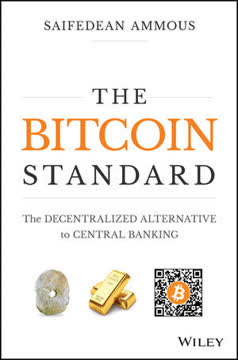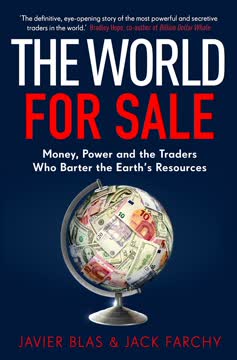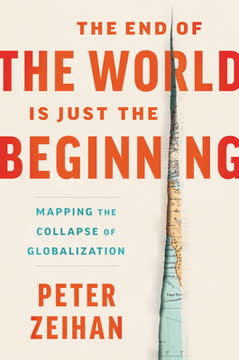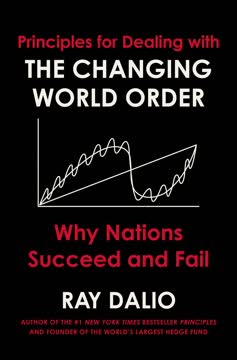Key Takeaways
1. The Big Cycle: Empires rise and fall in predictable patterns
"Everything that has happened and everything that will happen has had and will have determinants that make it happen."
The Big Cycle framework explains the rise and fall of empires throughout history. This cycle typically unfolds over 250 years (plus or minus 150 years) and consists of several stages:
- Rise: A new order begins with strong leadership and institutions
- Top: The empire reaches its peak of wealth and power
- Decline: Internal conflicts and external challenges emerge
- Crisis: Economic, social, and political pressures culminate
- Depression/Revolution/War: The old order breaks down
- New Order: A new cycle begins with restructured systems
Key factors driving this cycle include:
- Economic strength and productivity
- Technological innovation and education
- Military power and global influence
- Debt levels and financial stability
- Social cohesion and wealth distribution
2. Money, credit, and debt drive economic cycles and power shifts
"If you don't understand how money and credit work, you can't understand how the system works, and if you don't understand how the system works, you can't understand what's coming at you."
The debt cycle plays a crucial role in shaping economic and power dynamics. This cycle consists of two main parts:
-
Short-term debt cycle (5-8 years):
- Expansion: Easy credit leads to economic growth
- Contraction: Tightening credit causes recession
-
Long-term debt cycle (75-100 years):
- Debt accumulation over decades
- Debt bubble and eventual crisis
- Deleveraging and economic restructuring
Understanding these cycles helps predict:
- Economic booms and busts
- Inflation and deflation trends
- Currency valuations and exchange rates
- Shifts in global economic power
3. Internal order and disorder shape a nation's trajectory
"How people are with each other is the primary driver of the outcomes they get."
Internal stability is crucial for a nation's success and longevity. The cycle of internal order and disorder typically follows these stages:
- Strong leadership consolidates power
- Effective institutions are built
- Peace and prosperity flourish
- Excesses in spending and debt accumulate
- Wealth gaps widen, leading to social tensions
- Internal conflicts escalate, potentially leading to civil war
Factors influencing internal order:
- Quality of leadership and governance
- Strength of institutions and rule of law
- Economic opportunities and social mobility
- Wealth distribution and social cohesion
- Education and shared values
4. External conflicts and geopolitics influence global power dynamics
"All countries through time have had systems or orders for governing how they deal with each other."
Geopolitical relationships shape the global balance of power. Key aspects of external order and disorder include:
- Formation of alliances and rivalries
- Economic and trade relationships
- Military conflicts and arms races
- Diplomatic negotiations and treaties
- Competition for resources and influence
Types of conflicts between nations:
- Trade/economic wars
- Technology wars
- Geopolitical wars
- Capital wars
- Military wars
Understanding these dynamics helps predict shifts in global power and potential areas of conflict.
5. Education, innovation, and competitiveness fuel national success
"Human productivity is the most important force in causing the world's total wealth, power, and living standards to rise over time."
Human capital development is crucial for a nation's long-term success. Key factors include:
- Education system quality and accessibility
- Investment in research and development
- Entrepreneurial culture and support
- Technological innovation and adoption
- Workforce skills and adaptability
Benefits of strong human capital:
- Increased economic productivity
- Higher living standards
- Greater global competitiveness
- Enhanced ability to solve societal challenges
- Resilience in the face of change
Countries that prioritize these areas tend to rise in global power rankings and maintain their positions for longer periods.
6. Wealth gaps and social unrest precede major power shifts
"Throughout history various forms of groups of people (e.g., tribes, kingdoms, countries, etc.) have gained wealth and power by building it themselves, taking it from others, or finding it in the ground."
Wealth inequality often leads to social and political instability. The typical progression:
- Economic growth benefits a small elite
- Wealth gaps widen over time
- Social tensions increase
- Populist movements gain traction
- Political polarization intensifies
- Potential for revolution or significant reforms
Factors contributing to wealth gaps:
- Uneven access to education and opportunities
- Technological disruption of labor markets
- Globalization and outsourcing
- Tax policies favoring capital over labor
- Concentration of corporate power
Addressing wealth inequality is crucial for maintaining social stability and preventing destructive conflicts.
7. Reserve currency status brings both privilege and vulnerability
"Having a reserve currency is great while it lasts because it gives a country exceptional borrowing and spending power and significant power over who else in the world gets the money and credit needed to buy and sell internationally."
Reserve currency dynamics play a crucial role in global economic power. Benefits and risks include:
Benefits:
- Lower borrowing costs for the issuing country
- Global demand for the currency and its debt
- Ability to run larger trade deficits
- Geopolitical influence through financial system
Risks:
- Pressure to maintain global confidence in the currency
- Potential for excessive debt accumulation
- Vulnerability to shifts in global sentiment
- Risk of eventual loss of reserve status
Historical reserve currencies:
- Dutch guilder
- British pound
- US dollar
Understanding these dynamics helps predict potential shifts in global economic power and currency valuations.
8. The US-China rivalry echoes historical power transitions
"The world order is now rapidly shifting in important ways that have never happened in our lifetimes but have happened many times before."
The current US-China relationship mirrors historical patterns of rising and established powers. Key aspects of this rivalry include:
-
Economic competition:
- Trade disputes
- Technological race
- Currency and capital markets
-
Geopolitical tensions:
- Territorial disputes (e.g., South China Sea, Taiwan)
- Competing spheres of influence
- Military modernization and posturing
-
Ideological differences:
- Political systems (democracy vs. state capitalism)
- Human rights and governance philosophies
- Global governance visions
Historical parallels:
- Athens and Sparta in ancient Greece
- Britain and Germany before World War I
- US and Soviet Union during the Cold War
Understanding these dynamics helps anticipate potential areas of conflict and cooperation between the two powers.
9. Investing strategies must adapt to long-term economic cycles
"All markets are primarily driven by just four determinants: growth, inflation, risk premiums, and discount rates."
Investment implications of long-term economic cycles are significant. Key considerations:
-
Asset allocation:
- Diversify across countries, currencies, and asset classes
- Consider the stage of the debt cycle when making decisions
- Adapt to shifting economic and geopolitical landscapes
-
Currency risks:
- Be aware of potential currency devaluations
- Consider gold and other hard assets as hedges
-
Debt levels:
- Monitor government and private sector debt levels
- Be cautious of excessive leverage in the system
-
Technological disruption:
- Invest in sectors and companies driving innovation
- Be wary of industries vulnerable to technological change
-
Geopolitical risks:
- Consider the impact of trade tensions and conflicts
- Diversify across different geopolitical spheres
By understanding these long-term cycles, investors can better position themselves for future economic and market shifts.
10. Future world order will be shaped by current global trends
"To have peace and prosperity, a society must have productivity that benefits most people."
Emerging global trends will influence the future world order. Key factors to watch:
-
Technological advancements:
- Artificial intelligence and automation
- Biotechnology and healthcare innovations
- Clean energy and sustainability solutions
-
Demographic shifts:
- Aging populations in developed countries
- Growing middle class in emerging markets
- Migration patterns and urbanization
-
Climate change:
- Environmental impacts on economies
- Transition to sustainable energy sources
- Potential for resource-driven conflicts
-
Evolving global institutions:
- Reforms to international organizations
- New alliances and economic blocs
- Shifts in global governance models
-
Cultural and social changes:
- Evolving work patterns (e.g., remote work)
- Changing consumer preferences
- Shifts in societal values and priorities
Understanding these trends can help individuals, businesses, and policymakers better prepare for and shape the future world order.
Last updated:
FAQ
What's Principles for Dealing with the Changing World Order about?
- Historical Cycles: The book examines the rise and fall of empires, focusing on the cyclical nature of wealth and power dynamics. It highlights how these cycles are driven by universal principles.
- Big Cycle Framework: Ray Dalio introduces the "Big Cycle," which includes economic, political, and social factors influencing the rise and fall of nations.
- Current Global Dynamics: The book discusses contemporary geopolitical tensions, especially between the US and China, and how these dynamics may evolve.
Why should I read Principles for Dealing with the Changing World Order?
- Timely Insights: Given current global uncertainties, Dalio's analysis offers valuable perspectives on anticipating and responding to significant changes.
- Practical Application: The book provides actionable advice based on historical precedents, applicable to personal and professional life, especially in investment and economic decision-making.
- Expertise of the Author: Ray Dalio's experience as a successful investor lends credibility to his analysis, making it a valuable resource for understanding global macroeconomic trends.
What are the key takeaways of Principles for Dealing with the Changing World Order?
- Cycles of Rise and Decline: All empires experience cycles of growth and decay, influenced by economic, political, and social factors. Recognizing these cycles can help predict future trends.
- Importance of Adaptability: Nations and individuals must adapt to changing circumstances, with flexibility and a willingness to learn from history being crucial for success.
- Wealth and Power Dynamics: The book highlights how wealth and power concentration among a small elite can lead to societal tensions, emphasizing the need to address these disparities.
What are the best quotes from Principles for Dealing with the Changing World Order and what do they mean?
- "The times ahead will be radically different from those we’ve experienced in our lifetimes.": This quote underscores the inevitability of change and the importance of preparing for it.
- "Understanding history in this way also raises questions whose answers provide us with valuable clues on what the future will be like.": It emphasizes the value of historical study in informing present and future decisions.
- "The biggest thing affecting most people in most countries through time is the struggle to make, take, and distribute wealth and power.": This encapsulates the central theme of the book, highlighting the ongoing conflict over resources.
What is the "Big Cycle" as defined in Principles for Dealing with the Changing World Order?
- Definition of Big Cycle: The "Big Cycle" refers to recurring patterns of rise and decline that nations experience over time, encompassing economic, political, and social factors.
- Stages of the Cycle: Dalio outlines stages such as the rise of new leadership, periods of prosperity, and eventual decline due to internal and external pressures.
- Historical Examples: The book provides examples of empires like the Dutch, British, and American, illustrating how they followed similar patterns.
How does Ray Dalio define the long-term debt cycle in Principles for Dealing with the Changing World Order?
- Definition of the Cycle: The long-term debt cycle lasts 50 to 75 years and involves debt accumulation leading to a crisis, with stages including initial prosperity and eventual defaults.
- Stages of the Cycle: Dalio outlines six stages, from low debt and hard money to increased borrowing and crises, reflecting economic conditions and responses.
- Impact on Economies: This cycle affects both individual nations and the global economy, helping anticipate economic downturns and necessary adjustments.
How does Principles for Dealing with the Changing World Order explain the decline of empires?
- Common Themes in Decline: Dalio identifies themes like growing inequality, fiscal problems, and internal conflict, often leading to civil unrest and revolutions.
- Economic Mismanagement: Empires often face economic mismanagement, leading to excessive debt and inflation, eroding public trust and destabilizing politics.
- External Pressures: External pressures, such as military conflicts and competition from rising powers, can accelerate an empire's decline.
What are the implications of the US-China relationship discussed in Principles for Dealing with the Changing World Order?
- Rising Tensions: The book highlights increasing tensions between the US and China in trade, technology, and military domains as part of a broader struggle for dominance.
- Potential for Conflict: Dalio warns that competition could lead to military conflict, especially over issues like Taiwan, emphasizing careful management of differences.
- Global Impact: The US-China relationship affects global trade, economics, and geopolitics, making understanding it essential for anticipating future developments.
How does Principles for Dealing with the Changing World Order address the concept of monetary systems?
- Types of Monetary Systems: Dalio discusses hard currency, commodity-backed currency, and fiat currency, each with implications for economic stability and growth.
- Historical Patterns: The book outlines transitions between these systems throughout history, often leading to inflation and economic crises.
- China's Monetary Evolution: Dalio highlights China's historical experiences with monetary systems, informing current Chinese monetary policy and global finance approach.
How does Ray Dalio define populism in Principles for Dealing with the Changing World Order?
- Political and Social Phenomenon: Populism arises when ordinary people feel ignored by elites, leading to leaders who claim to represent the common man.
- Emotional Appeal: Populist leaders appeal to emotions rather than rational discourse, fostering division and conflict between factions.
- Historical Examples: The book references historical instances like communism and fascism to illustrate populism's potential consequences.
How does Principles for Dealing with the Changing World Order suggest nations can prepare for future challenges?
- Long-term Planning: Dalio advocates for strategic planning, emphasizing understanding historical patterns to inform current decisions.
- Adaptability and Resilience: Nations must be adaptable and resilient, prepared for economic downturns, social unrest, and geopolitical conflicts.
- Collaboration and Understanding: Building relationships based on respect and shared interests can help mitigate conflicts and foster stability.
How can I apply the principles from Principles for Dealing with the Changing World Order to my personal life?
- Financial Awareness: Dalio encourages assessing financial situations critically, understanding income, expenses, and debt levels for informed decisions.
- Long-term Thinking: The book promotes a long-term perspective on investments and personal goals, focusing on sustainable growth.
- Engagement in Societal Issues: Understanding wealth and power dynamics can motivate engagement in social and political issues, contributing to positive change.
Review Summary
Principles for Dealing with the Changing World Order by Ray Dalio presents a comprehensive analysis of historical cycles in global power dynamics. Readers appreciate Dalio's insights into economic and geopolitical trends, particularly regarding the US-China relationship. The book's data-driven approach and long-term perspective are praised, though some criticize its repetitiveness and potential bias. While many find the content thought-provoking, opinions vary on Dalio's predictions and interpretations. The book's structure and writing style receive mixed reviews, with some finding it dense but informative, while others struggle with its verbosity.
Similar Books










Download PDF
Download EPUB
.epub digital book format is ideal for reading ebooks on phones, tablets, and e-readers.








